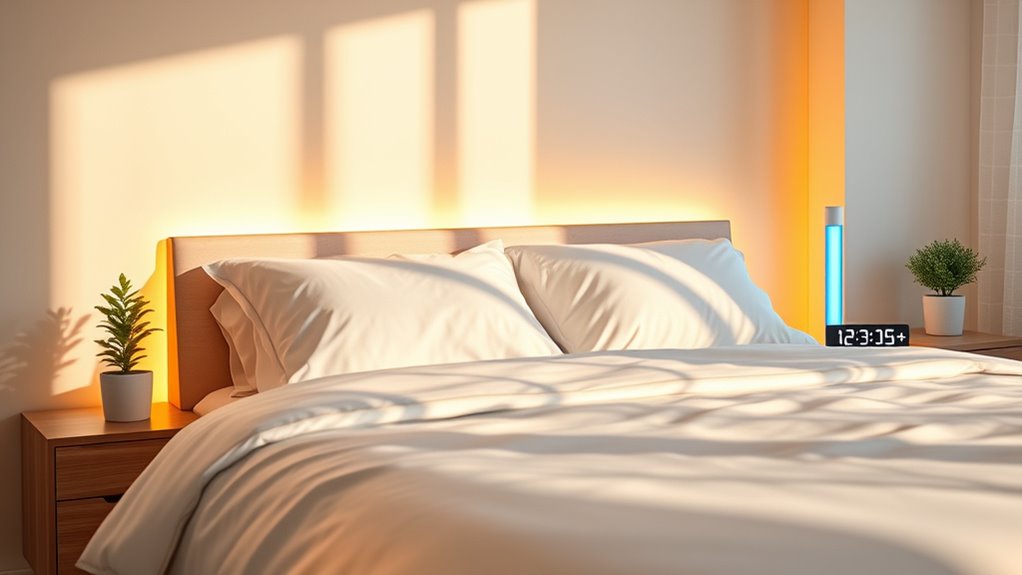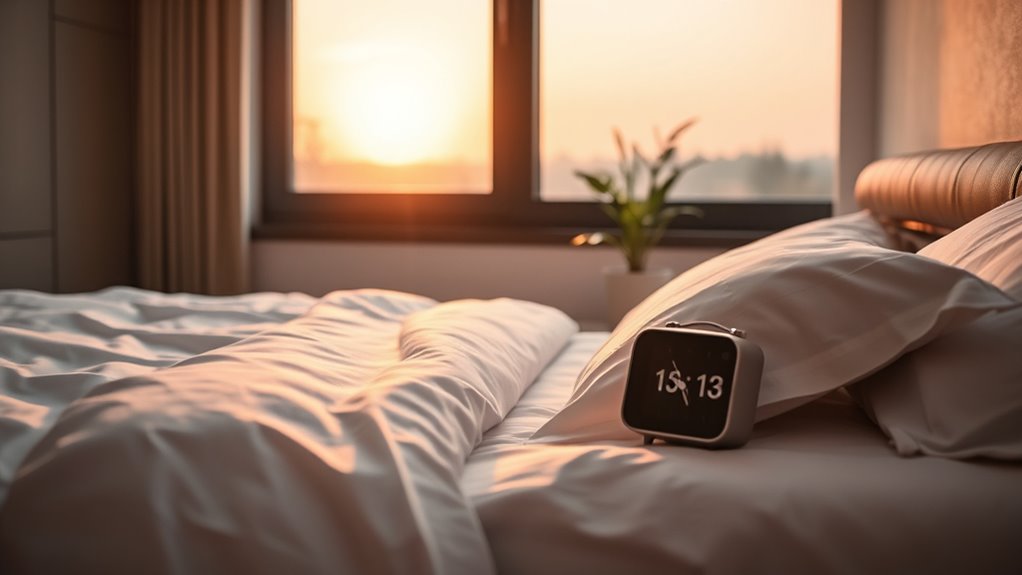Your sleep depends on your circadian rhythm, your internal clock that syncs with environmental cues like light. To optimize your sleep schedule, expose yourself to natural sunlight during the day to reinforce alertness, and avoid blue light from screens in the evening, since it inhibits melatonin production. Maintaining consistent sleep and wake times helps keep your rhythm steady. Creating a dark, cool sleeping environment also supports healthy sleep cycles—discover more ways to enhance your sleep quality below.
Key Takeaways
- Exposure to natural light during the day helps synchronize your internal clock and improves sleep quality.
- Limiting blue light from screens at least an hour before bedtime supports melatonin production.
- Maintaining consistent sleep and wake times reinforces your circadian rhythm and enhances sleep regularity.
- Creating a dark, cool, and quiet sleep environment promotes melatonin release and better sleep.
- Establishing a bedtime routine that minimizes artificial light and stress helps optimize your sleep schedule.

Your circadian rhythm is an internal clock that regulates your sleep-wake cycle, helping you feel alert during the day and sleepy at night. Understanding how this rhythm functions is key to optimizing your sleep schedule. One of the most essential aspects of maintaining a healthy circadian rhythm is melatonin regulation. Melatonin is a hormone that signals to your body that it’s time to sleep, and its production is closely tied to light exposure. During the day, exposure to natural light suppresses melatonin, keeping you alert. As evening approaches and light diminishes, your body increases melatonin production, making you feel sleepy. If your light exposure is inconsistent or if you spend too much time under artificial lights at night, it can disrupt this delicate balance, leading to difficulties falling asleep or waking up feeling unrefreshed.
Maintaining natural light exposure supports melatonin balance and healthy sleep cycles.
To support proper melatonin regulation, you should aim to get plenty of natural light during the day. Spending time outside in the sunlight helps reinforce your internal clock and guarantees your melatonin production aligns with your natural environment. Conversely, in the evening, reduce exposure to bright artificial lights, especially blue light emitted by screens. Blue light inhibits melatonin production, delaying sleep onset and disrupting your circadian rhythm. Using dim, warm lighting in the evening can help signal to your body that it’s time to wind down, promoting natural melatonin release.
Consistency is essential for your circadian rhythm to function effectively. Going to bed and waking up at the same times each day helps stabilize your internal clock and supports regular melatonin cycles. This consistency makes it easier for your body to predict sleep and wake times, reducing sleep disruptions. Avoiding late-night screen time and bright lights at least an hour before bed can further help your body prepare for sleep by allowing melatonin levels to rise naturally. Additionally, understanding the role of contrast ratio in your environment can influence sleep quality, as optimal contrast can help create a comfortable setting conducive to rest.
Your environment plays a significant role in circadian regulation. Keep your bedroom dark and cool to promote healthy melatonin production. Consider blackout curtains or eye masks if external light intrudes during sleep hours. Maintaining a regular sleep schedule and managing light exposure are simple yet effective ways to reinforce your circadian rhythm, leading to better sleep quality and overall health. When your internal clock is properly aligned, you’ll find it easier to fall asleep, stay asleep, and wake feeling refreshed, ready to take on the day.
Frequently Asked Questions
Can Circadian Rhythms Vary Significantly Between Individuals?
Yes, your circadian rhythms can vary markedly because of genetic variation and environmental influences. These factors shape your internal clock, affecting your sleep-wake patterns, alertness, and energy levels throughout the day. You might find you naturally feel more alert in the evening or morning, depending on your unique genetic makeup and daily surroundings. Understanding these differences helps you tailor your sleep schedule to optimize your overall health and well-being.
How Does Aging Affect My Circadian Rhythm?
Aging messes with your circadian rhythm, making it harder to keep a steady sleep schedule. As you grow older, your body produces less melatonin, the hormone that signals sleep. This hormonal shift throws off your natural rhythm, causing you to wake up earlier and feel groggier. So, embrace those early mornings—your circadian system is just telling you it’s time for a new chapter, one with less sleep and more surprises.
Are There Genetic Factors Influencing Circadian Cycle Differences?
Yes, genetic factors influence your circadian cycle. Your genetic predispositions can determine your natural sleep-wake preferences, known as chronotype variations, making you a morning lark or a night owl. These differences affect your alertness and sleep patterns. Understanding your genetics helps you tailor your sleep schedule, optimizing your energy levels and overall health by aligning with your body’s innate circadian tendencies.
Can Lifestyle Changes Permanently Shift My Circadian Rhythm?
Think of your circadian rhythm as a garden that needs regular care. You can shift it with consistent lifestyle changes like morning light exposure and meal timing. For example, someone who starts eating earlier and gets sunlight in the morning often finds their sleep schedule shifting gradually. While these changes can be lasting, they require ongoing effort to maintain, much like tending a garden to keep it healthy.
How Do Jet Lag and Shift Work Disrupt Circadian Rhythms?
Jet lag and shift work disrupt your circadian rhythms by confusing your internal clock, especially through irregular light exposure and meal timing. When you travel across time zones or work odd hours, your body struggles to sync with the new schedule, causing fatigue and sleep issues. To minimize this, try to get natural light during the day and maintain consistent meal times, helping your body adjust more quickly.
Conclusion
Think of your circadian rhythm as the steady lighthouse guiding your nightly voyage. When you align your sleep schedule with its beam, you navigate smoothly through restful waters each night and wake refreshed each morning. Ignoring this beacon risks drifting into foggy, restless nights. Embrace the rhythm’s glow, and let it steer your sleep, transforming your nights into a sanctuary of renewal and your days into vibrant journeys. Your ideal sleep awaits, just follow the lighthouse’s light.








